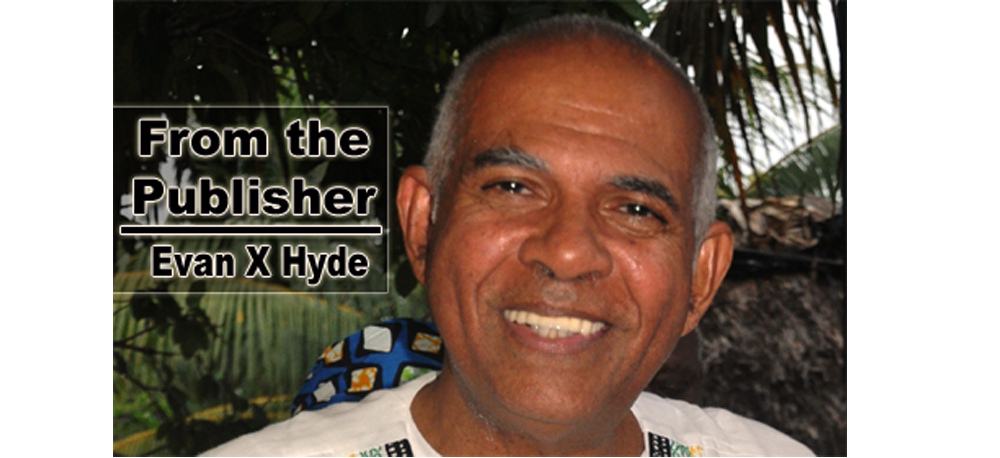Suffering from sleep disorders as I do, it took an extra effort last week Wednesday night to stay up to listen to Jules Vasquez’ interview with Nigerian professor Joe Iyo about his new book, wherein he publishes interviews over the last couple decades with former UBAD officers and members.
Well, Jules, of course, is a brilliant thinker and interviewer, and Professor Iyo has spent more than two decades in Belize, has taught extensively at the University of Belize, and has published books about Belize and its history. So, I sat and listened.
Personally, I almost never write about UBAD any more, because what we are seeing today at the base of Belize’s youth pyramid has almost no relevance to UBAD, apart from the fact that our young Belizean people don’t do a lot of in-depth reading. This is a social media generation.
Professor Iyo, and Jules to a large extent, ended up concluding that UBAD (1969-74) was doomed because of its “lack of transparency” and its “naivete.”
The Grenada Revolution, which lasted from 1979 to 1983, featured two leaders who had been close friends – Maurice Bishop and the less famous Bernard Coard. The revolution, under severe pressure, ended with a split between Bishop and Coard which sparked horrendous murders and violence. Maurice was slaughtered and Bernard went to jail. So then, what doomed the Grenada Revolution? The bottom line, for purposes of this essay, is that Bishop and Coard had achieved maximum political power and held it for four years.
After the split in UBAD in early 1973, the last year of its existence, in retrospect, was an afterthought. So, let us say, for purposes of time symmetry, that UBAD also lasted for four years, from 1969 to 1973. UBAD began as a cultural organization in February of 1969. It is fairly clear that what we experienced then was spontaneous sociological ignition. UBAD began drawing huge crowds in the spring/summer of 1969.
But, UBAD never achieved any political power, as the Grenada Revolution did, and, perhaps just as significantly, UBAD never found any source of meaningful financial support.
So then, after all the “lack of transparency” and “naivete,” how did UBAD survive for four years? How did UBAD survive an attempt by the ruling political party to imprison its two major leaders in 1970? As an academic aside, how did UBAD survive without a significant number of its women in its executive leadership?
As we look back 54 years, at how Belize has changed, we see how our young people who flocked to UBAD in 1969 have separated themselves from each other in the different neighborhoods of Belize City over the last three and a half decades and now routinely murder each other, increasingly with high-powered, automatic weapons.
You can’t begin to penetrate the propaganda surrounding Belize’s socio-political reality until you expose the power structure which has been ruling Belize all this while, and the “gatekeepers,” to use Professor Iyo’s term, who have blocked African and Maya history and have refused to support the economic infrastructure which appeared to have some kind of promise in 1969.
Today, apart from the neighborhood wars raging in our population center, we face the specter of an International Court of Justice judgment which may have serious implications for Belize’s sovereign future.
I have a younger brother, second to me, who is, relatively and privately, even more extreme than I may be in some respects. The other day we both agreed, in front of our siblings, that none of us had raised our children to be like us. In my case, I can say that I saw how difficult it was to survive while traveling the road I was on, and so I tried to make sure my children moved in a direction of their own choosing.
I end with this “lack of transparency” and “naivete”? Can you explain to me how the hell UBAD held together for four years under all the negative circumstances? There is only one academic I know who has remarked on the extraordinary effort it took to maintain the cohesion of UBAD, and that academic is Mr. Lawrence Vernon.
Again, I can see where the introduction of cocaine in the late 1970s would have made UBAD’s job a lot more difficult than it was in the earlier Seventies.
Jules and Joe, bottom line, should be complimented for undertaking the difficult assignment of trying to unravel all the different strands of UBAD.
But, I suppose it will add importantly to the discussion if someday I tell you all I know about the incredible Charles X “Justice” Eagan (Ibrahim Abdullah). How different would this modest UBAD history have been if there had not been Charles X Eagan, may his soul live forever.

